Day 3 of the First International Exhibition of Calligraphy
Evening is the time for summarizing the results achieved through the day. With a huge list of master-classes, lectures, and presentations pickaback, it is quite difficult to believe that all of them took place within one day.
The morning witnessed the lecture by Nikolai Taranov, Doctor of Pedagogic Sciences, Candidate of Art History, Professor, member of the Union of Artists of Russia, who narrated the history of the Slavic Calligraphy.
The well-known professor told the audience about the evolution of writing in the Slavic countries and regions. He paid specific attention to the mysteries hidden behind the Glagolitic alphabet, being a bit quaint and weird alphabet, destined to disappear under the pressure of the Cyrillic alphabet.
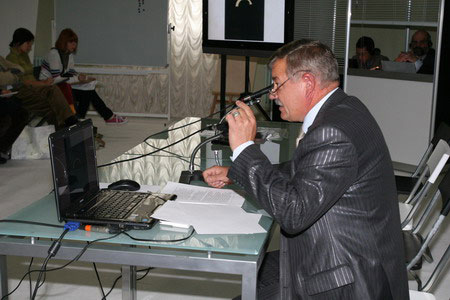 Professor Nikolai Taranov
Professor Nikolai TaranovAfter this lecture, all visitors had only 15 minutes to catch their breath before the second master-class. Yevgeny Dobrovinsky, member of the Union of Artists of Russia, member of the Union of Russian Designers, member of the Academy of Graphic Design, gave a talk entitled “Calligraphy – Searching for the lost hand”. It is no secret that today a beautiful writing is a simple skill of turning on your computer and choosing the most appropriate font. Mr. Dobrovinsky was trying to answer two questions, “Why?” and “Are we able to reverse this trend?”
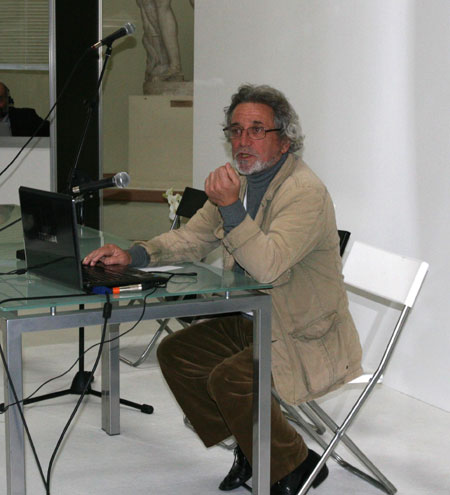 Professor Yevgeny Dobrovinsky
Professor Yevgeny DobrovinskyAt 01.00 pm, all guests and visitors attended another unsurpassed lecture and presentation by Yaroslav Kuts, a recognized calligraphy writer and teacher from Ukraine. He gave a lecture on ways and methods to adapt Roman scripts onto the Slavic basis. This age-long question of merging and interaction of Roman and Cyrillic alphabets covered the following spectrum of issues: the nature of letters, means of communicating this nature in the most appropriate way, conveying the mood of the letters, usage of various scripts. The Ukrainian designer and graphic expert engaged all participants in heated discussions and debates.
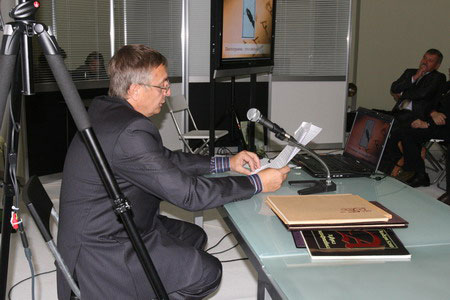 Lecture and demonstration from Yaroslav Kuts
Lecture and demonstration from Yaroslav KutsHowever, the day was not only all about lectures. Pyotr Chobitko together with his apprentice Olga Varlamova delivered a master-class for calligraphy lovers.
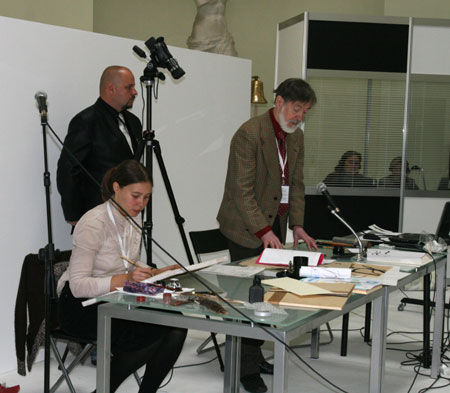 Master-class held by Pyotr Chobitko and Olga Varlamova
Master-class held by Pyotr Chobitko and Olga VarlamovaThe major topic unveiled the secrets of the Uncial and Half-uncial Cyrillic Book Hand, peculiarities of the Russian Cyrillic Cursive Handwriting and Semi-uncial Cyrillic Cursive Handwriting with the help of such broad-nib writing utensils as reed canes, pens, and brushes.
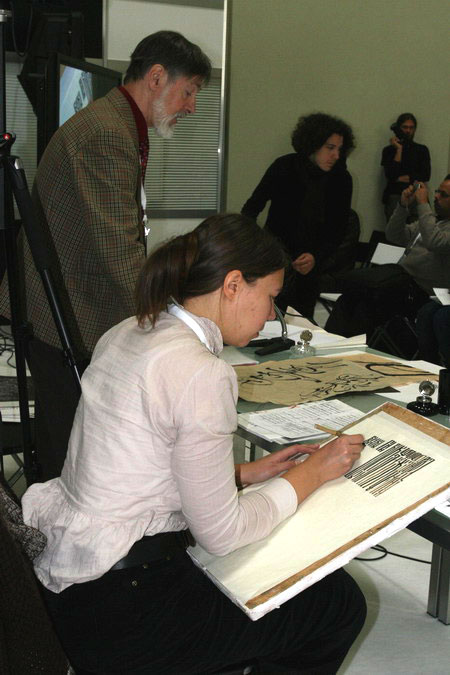 Olga Varlamova shocking the crowds with her skill
Olga Varlamova shocking the crowds with her skillAnd yet, the highlight of the day was a round-table discussion.
It seems that this discussion covered the whole spectrum of issues regarding the interplay between the art of calligraphy, psychology, and medicine, such as: “Calligraphy and Personal Growth”, “Calligraphy and Longevity and Vitality”, “Calligraphy and Child’s Physical and Mental Development”.
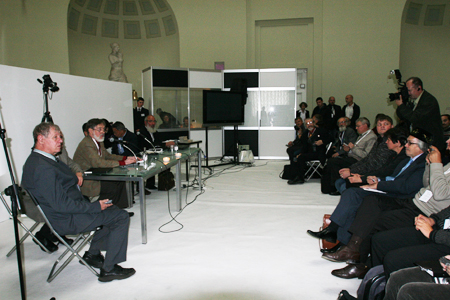 The round-table discussion
The round-table discussionIt was a true pleasure to see all these recognized calligraphy writers coming from all over the globe absorbed in talks on the ever-increasing role of calligraphy, on this art becoming a hobby of many people, and its stimulating influence on life quality. They were enthusiastically discussing the fact that beautiful handwriting has a beneficial effect not only on the author’s mood, but also on her health.
It is quite difficult to estimate the significant role and scale of this event. Suffice it to say that the round-table witnessed reports from the best representatives of calligraphic schools, Pyotr Chobitko, Pavel Semchenko, Vladimir Zaitsev, Valery Slezin, Yuan Pu, Henry Kao among them.
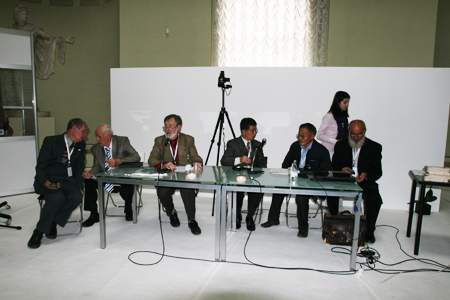 The round-table discussion
The round-table discussionMany fantastic events are yet to come. We would like to wish all forum participants not to miss a bit of a train of pleasant surprises and little discoveries.
When there are no words left, the meaning is still preserved.



